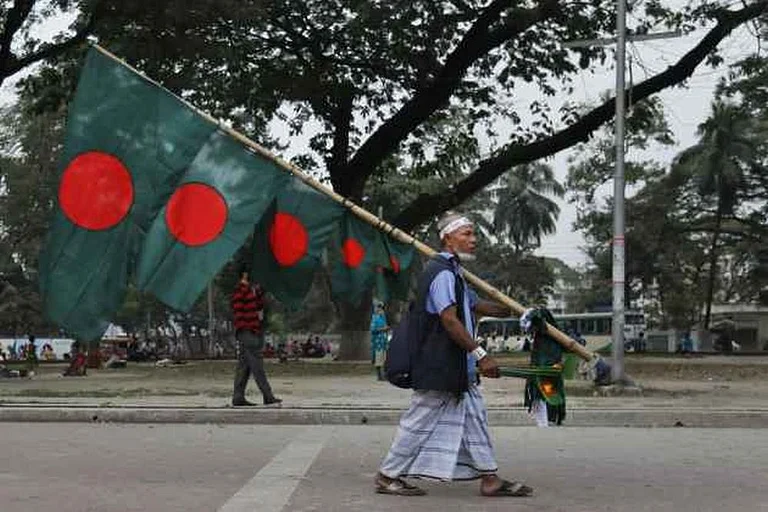India on Thursday and Friday organised a first-of-its-kind of Buddhist summit that witnessed participation from around 30 countries.
While Prime Minister Narendra Modi addressed the inaugural session of the summit on Thursday, the Dalai Lama addressed a closed-door session on Friday.
The theme of the two-day summit was "Responses to Contemporary Challenges: Philosophy to Praxis". It was hosted by the Ministry of Culture in collaboration with the International Buddhist Confederation (IBC) at The Ashok Hotel im Delhi.
Among the audience were delegates from 30 countries apart from India. Eminent Buddhist monks, scholars, ambassadors and diplomats were among the participants.
In his address, Modi touched a number of themes ranging from climate change to international conflict. He said the world is passing through challenges such as war, economic instability, terrorism, religious extremism, and climate change and asserted that Lord Buddha's ideas offer a solution to these problems.
The Dalai Lama also participated in a closed-door session on Friday and spoke for around half an hour, reported PTI.
Buddha's teaching need of the hour: Modi
Addressing the inaugural session of the Global Buddhist Summit, Modi took a swipe at rich countries, saying the world is facing a climate change crisis now because in the last century, "some countries stopped thinking about others and the coming generations".
He said, "For decades they kept thinking that meddling with nature will not impact them. They kept putting it on others."
Emphasising that the path shown by Buddha is the "path of the future and sustainability", Modi also said that "had the world followed His teachings, it would not have faced the climate change crisis".
Modi quoted ancient texts on Buddha's teachings and said the need of the hour is that people and nations prioritise global interests along with that of their own by drawing inspiration from the Buddha's philosophy.
This is the road to a happy and stable world, this is necessary to move from self to the wider world, from narrowness to integral (approach), said Modi, adding that the world will have to think about the poor and countries lacking resources.
Inspired by the teachings of Buddha, India is taking new initiatives for global welfare, said Modi.
Modi asserted that India has been following the path shown by the Buddha and cited the country extending help to others, including Turkiye after it was hit by an earthquake, to say that it has treated every human being's pain as its own.
He said, "Challenges to solutions is the journey of the Buddha ('samasya se samadhan'). The Buddha didn't leave his palace because He was in discomfort, He left because he saw and felt the pain of others."
It is universally accepted that today's time is the "most challenging time of the century, Modi said.
He said, "Two countries have been at war, the world is going through economic instability, terrorism and religious extremism are assaulting the soul of humanity, climate change crisis is hovering over humanity, glaciers are melting, ecology getting destroyed, species getting extinct. Yet there are crores of people, like those sitting here, who have faith in the Buddha. This faith gives strength."
Dalai Lama addressed closed-door event
Tibetan spiritual leader the Dalai Lama on Friday participated in the Global Buddhist Summit and addressed a group of monks and other delegates who have gathered here for the two-day event, sources said. He spoke for about half an hour and emphasised on Buddhist philosophy and values.
The summit is divided into two segments, academic and Sangha sessions. Media was allowed only for the inaugural session, the rest of the sessions are not open to the press, an official source told PTI.
The source, however, confirmed that the Dalai Lama attended the summit on Friday morning and addressed gathered monks and other delegates.
"In his nearly half-an-hour address, the Tibetan spiritual leader spoke of compassion, wisdom and meditation," he told PTI.
On Monday, at a press conference here, organisers had said that invite was sent to the Dalai Lama, but till that time it wasn't confirmed whether he would attend the event.
An official source in the Dharamshala-based Central Tibetan Administration, the Government in Exile of Tibet, had early on Friday morning told PTI that "His Holiness will attend the event".
Increased engagement with Dalai Lama, Tibetans
In contrast to last few years, the official engagement of the Government of India with the Dalai Lama and the Tibetans in exile has increased in recent years. It is seen in context of worsening relationship with China.
Last year, the Dalai Lama was in Ladakh for a month, where he met top Indian officials and engaged with the Indian military as well. The engagements were significant as they took place in the midst of the ongoing India-China stand-off in Ladakh, which China claims as part of its own territory.
Consider this: In 2018, the Government of India asked senior leaders and officials to not attend key events marking 60 years of Tibetans' exile in India. However, in 2022, Prime Minister Narendra Modi publicly wished the Dalai Lama on his birthday for the second year in a row, the Dalai Lama travelled in Indian military aircraft in Ladakh, and Indian leaders openly attended Tibetan events.
Last year, the Dalai Lama was also flown by the Indian Air Force in Ladakh. Notably, China claims Ladakh as its own territory and also considers the Dalai Lama a separatist. Therefore the move was considered a snub from India to China.
In December 2021, six MPs across party lines, including Union minister Rajeev Chandrasekhar, attended an event organised by Tibetan Parliament-in-Exile, to which the Chinese Embassy in New Delhi had reacted angrily.
While China wants New Delhi to separate the boundary dispute from the broader bilateral relationship, New Delhi has made it clear that the two cannot be separated. External Affairs Minister S Jaishankar has said multiple times that broader cooperation and border conflict cannot go together.
"The [India-China] relationship is at a crossroads and which direction it will go depends on whether China adheres to the 1988 consensus and follows through on agreements over the decades...What was very clear last year was that border tensions cannot continue with cooperation in other area," said Jaishankar at an event in 2021.
The idea is that if China does not care about Indian sensitivities, then India would also not care about China's sensitivities. This is understood to be main reasons why New Delhi has increased engagement with Tibetans in exile.
India's Buddhist diplomacy
The first-of-its-kind of Buddhist Summit is also being seen as part of India's 'Buddhist Diplomacy' which is part of the broader soft power display of India.
While India organised the Buddhist Summit in India this year, Modi was in Buddha's birthplace of Lumbini in Nepal last year to take part in a traditional shilanyas ceremony to start the construction of the India International Centre for Buddhist Culture. Besides the Buddhist Centre, a memorandum of understanding was also signed between the Indian Council of Cultural Relations and the Lumbini Buddhist University for the establishment of the Dr Ambedkar Chair of Buddhist Studies. Ambedkar had converted to Buddhism along with a large number of his followers.
Earlier, Outlook's Seema Guha noted, "India is leveraging its soft power and its shared Buddhist credentials across Asia to build goodwill in the region. This is not new. Successive governments in the past have brought into play India’s rich historical and cultural heritage to establish people-to-people links...India is leveraging its soft power and its shared Buddhist credentials across Asia to build goodwill in the region. This is not new. Successive governments in the past have brought into play India’s rich historical and cultural heritage to establish people-to-people links. "
However, experts feel India could have done better over the years.
Former diplomat Ashok Sajjanhar said, "Buddhist diplomacy works hugely. It strikes a very responsive chord in people. I remember when I was posted in Thailand, a sapling from the Bodhi tree taken from India as a gift was worth its weight in not gold but platinum. We could have done much better,” said Sajjanhar. However, in the last few years, India is playing much more attention to culture and soft power for diplomatic outreach."
China has also tried to use Buddhism over the years, pointed out Sajjanhar.
He earlier told Outlook, "China has been laying claim to its Buddhist heritage by organising conferences and claiming old historical links to Buddhism. India should have been more active in the past."
(With PTI inputs)


























